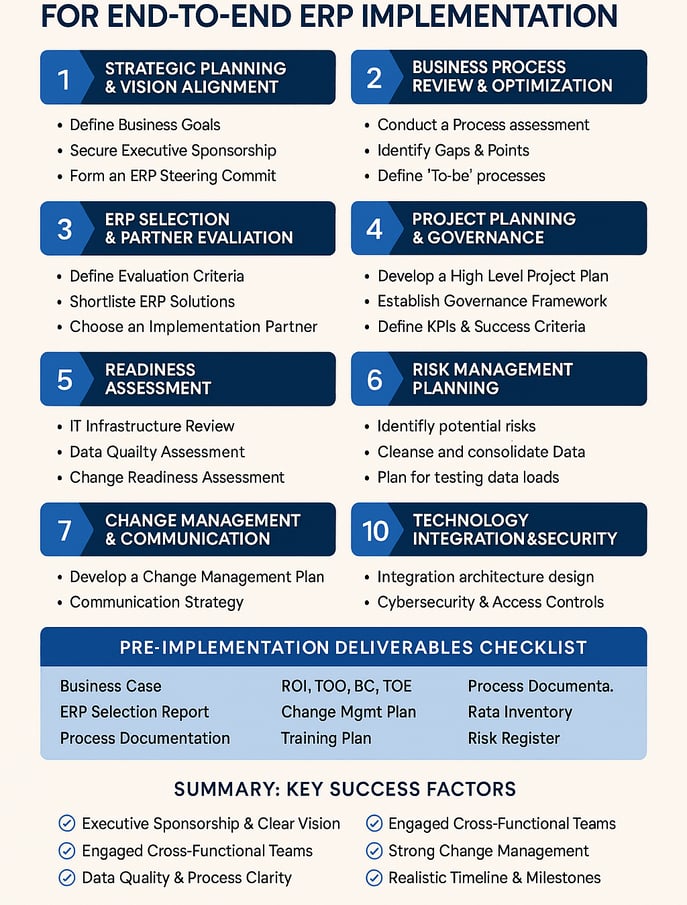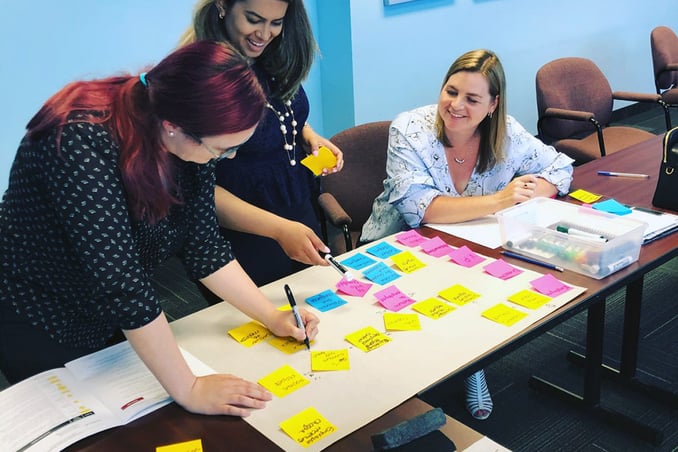ERP implementation is a strategic transformation, not just a tech project. We believe the journey begins well before implementation. Our Pre-Implementation Services are designed to help you reduce risk, align stakeholders, plan effectively, and ensure long-term success.
Whether you're migrating to SAP S/4HANA, evaluating Oracle NetSuite, or implementing Microsoft Dynamics 365, we help you prepare with clarity and confidence.
Ensure Success with our Pre-Implementation Services


1. Business Process Assessment
We map and assess your existing business processes to identify inefficiencies, bottlenecks, and automation opportunities. This becomes the baseline for ERP selection and customization.
2. ERP Readiness Assessment
We evaluate your organization’s preparedness across systems, data, people, and change management. You get a readiness scorecard and actionable recommendations.
3. Solution Fitment & Vendor Evaluation
With hundreds of ERP options available, we help you define requirements, shortlist platforms, and evaluate vendors. Our marketplace allows you to connect with vetted ERP solution providers and freelance experts.
4. Business Case & Budgeting
We support your internal approvals by helping you build a clear business case with ROI estimates, TCO analysis, and implementation budgets, including buffer planning.
5. ERP Roadmap & Implementation Planning
We help you decide the right implementation approach (greenfield, brownfield, or hybrid) and deployment model (cloud, on-prem, or hybrid). We also prepare a phased roadmap with timelines and change management plans.
How ERPMandi helps in preparing for ERP implementation?
ERP-agnostic and unbiased guidance
Industry-specific process knowledge
Access to a curated ERP marketplace
Backed by experienced ERP professionals with global exposure
ERPMandi Advantage
Proven Results
A manufacturing firm avoided ₹75L in hidden costs through our vendor-neutral advisory
A retail chain completed ERP rollout 3 months early with our process roadmap
A startup selected the right ERP with zero customizations and 100% cloud adoption
Our Approach
1. Strategic Planning & Vision Alignment
Define Business Goals: Align ERP implementation with strategic goals (e.g., scalability, process efficiency, compliance).
Secure Executive Sponsorship: A strong leadership mandate is critical for driving cross-functional buy-in.
Form an ERP Steering Committee: Include business heads, IT, finance, operations, and change management leaders.
2. Business Process Review & Optimization
Conduct a Process Assessment: Document “as-is” processes across departments.
Identify Gaps & Pain Points: Prioritize areas needing standardization, automation, or improvement.
Define “To-Be” Processes: Create a future state model aligned with best practices and ERP capabilities.
3. ERP Selection & Partner Evaluation
Define Evaluation Criteria: Functional fit, industry alignment, scalability, integration capability, total cost of ownership.
Shortlist ERP Solutions: Consider Tier 1 vs Tier 2 ERPs (e.g., SAP S/4HANA, Oracle, Microsoft D365, Infor).
Choose an Implementation Partner: Assess their industry experience, methodology, and support capability.
4. Readiness Assessment
IT Infrastructure Review: Evaluate on-premise vs cloud options, hardware readiness, cybersecurity protocols.
Data Quality Assessment: Identify sources, clean historical data, and plan for migration.
Change Readiness Assessment: Understand employee mindset and organizational maturity for digital transformation.
5. Project Planning & Governance
Develop a High-Level Project Plan: Define milestones, deliverables, budget, and timeline.
Establish Governance Framework: Clear roles, RACI matrix, decision-making protocols.
Define KPIs and Success Criteria: Operational efficiency, reduced cycle time, improved visibility, etc.
6. Budgeting & Resource Allocation
Create a Realistic Budget: Include software licenses, implementation services, training, data migration, and contingency.
Allocate Internal Resources: Dedicated project team, SMEs, IT staff, and change agents.
7. Change Management & Communication
Develop a Change Management Plan: Address “what’s changing and why,” stakeholder concerns, and training needs.
Communication Strategy: Keep employees informed, involved, and motivated.
Training Needs Analysis: Plan for end-user training, train-the-trainer programs, and ongoing support.
8. Risk Management Planning
Identify Potential Risks: Data loss, resistance to change, scope creep, vendor delays.
Mitigation Strategies: Contingency planning, phased rollout, effective issue escalation.
9. Data Management Strategy
Define Master Data Governance: Ownership, standards, and processes.
Cleanse and Consolidate Data: Avoid garbage-in-garbage-out during migration.
Plan for Testing Data Loads: In test environments before go-live.
10. Technology Integration & Security
Integration Architecture Design: Define interfaces with legacy systems, third-party apps, IoT, etc.
Cybersecurity & Access Controls: Plan role-based access, audit logs, and compliance measures.




Business Process Master List for Agri Business (interactive)
This comprehensive Business Process Master List (BPML) provides a structured view of key operational areas within the agri business sector. Business users can leverage the top-level dropdown filters to navigate through Level 1, Level 2, and Level 3 processes. Upon selection, the corresponding Level 4 processes and relevant Potential ERP Modules will be displayed, facilitating a clear understanding of how an integrated ERP system can support your specific agribusiness needs and is also useful in drafting business requirements for selection of the best fit ERP solution. This structure aims to provide an intuitive and efficient way to explore the agribusiness process landscape and understand the role of ERPMandi in streamlining operations. For more detailed information or specific inquiries, please contact our team.
